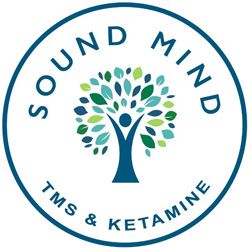Get in touch
1809 Dahlke Drive Cullman, AL, 35058
M-F 8AM-5PM, Saturdays by appointment only
210 Main Ave SW, Cullman, AL 35055
KETAMINE FOR DEPRESSION
FOR CULLMAN & NORTH ALABAMA
Sound Mind TMS & Ketamine Therapy is proud to offer the latest in mental health treatment options. In addition to high levels of safety standards and patient care, Sound Mind offers ketamine infusion therapy for the treatment of anxiety, as well as other mood disorders like depression, PTSD and OCD.
For those struggling with treatment resistant conditions, Ketamine infusions have proven to be a robust and rapid treatment for depression and other mental health conditions.
WHY KETAMINE?
Ketamine is an inspiring treatment option because in some cases it can provide relief from symptoms within days or even hours. Traditional treatments for depression can sometimes take weeks or even months before symptom relief including antidepressants, medications prescribed by psychiatrists, and other traditional psychiatric services.
Ketamine for depression treatment offers rapid and robust treatment for the symptoms of clinical depression, with up to 75% of patients reporting a positive response to just a single infusion. The initial benefit may last only 3-5 days, therefore an initial series of 6 treatments given over 2-3 weeks is recommended to increase the duration of well-being before a ketamine booster dose is needed.
HOW DOES KETAMINE HELP WITH DEPRESSION?
It is believed that it produces an antidepressant effect via targeting the NMDA receptors inside the brain. By connecting to those receptors, ketamine may be able to amplify the release of glutamate neurotransmitters in multiple brain pathways.
This ketamine induced burst of glutamate release stimulates AMPA receptors resulting in the release of brain derived neurotropic factor (BDNF) as well as multiple other neurotransmitters that boost the brain’s neuroplasticity – essentially, ketamine infusion allow the brain to reset and restore important nerve connections.
WHAT IS DEPRESSION?
Depression is a mood disorder and mental health condition that affects millions of Americans each year. Depression can cause intense sadness, which then can lead to someone stepping away from their responsibilities in favor of isolation from both their loved ones and their social life. It also deeply affects how a person thinks or behaves, as well as brings on a bevy of emotional or physical problems like persistent anxiety. With depression, it can become difficult to complete everyday tasks, and in some cases, one may have suicidal thoughts.
QUICK LINKS TO LEARN MORE
WHEN YOU SUFFER FROM DEPRESSION OR A NEUROLOGICAL DISORDER, YOU ARE NOT ALONE. YOU CAN GET HELP.

KETAMINE INFUSION CAN HELP WITH:
- Depression
- Anxiety
- PTSD
- Fibromyalgia
WHAT ARE THE CAUSES OF DEPRESSION?
Depression is very complex and can be caused by several different factors. In fact, depression is typically the result of a mix of factors both internal and external, such as differences in biology, differences in brain chemistry, hormonal changes, and family history.

WHAT ARE THE COMPLICATIONS OF DEPRESSION?
Depression is not something that goes away if ignored or untreated and will likely only get worse if not addressed early on. It can quickly become a great hindrance to one’s emotional and mental health. Examples of this include:
- Obesity
- Diabetes
- Heart disease
- Physical illness
- Pain or chronic aches
- Social phobia
- Work or school problems
- Relationship troubles with loved ones
- Social isolation and withdrawal
- Suicidal ideations or attempts
- Self-harm
- Dementia
DIFFERENCES IN BIOLOGY?
Research shows that those suffering from depression may have physical changes within the brain, like brain shrinkage, inflammation, oxygen restriction, and structural/connective changes. While the exact significance of these differences is still not known, this may aid research in the future.
DIFFERENCES IN BRAIN CHEMISTRY?
Neurotransmitters are chemical substances in the brain, oftentimes described as the human body’s chemical messengers. Research is still in progress but indicates that changes to the function and result of the neurotransmitters in the brain, as well as how they connect with neural circuits, may contribute to both the onset of depression and additionally how it is treated.
HORMONAL CHANGES
Depression can be caused by hormonal changes in the body that come around during/after pregnancy, menopause, thyroid issues, or other underlying conditions that have yet to be discovered.
Hormone changes may come about during pregnancy (or after delivery) or from thyroid problems, menopause, or other conditions yet undiscovered.
FAMILY HISTORY
One is more likely to develop depression or experience depressive episodes if a family member also suffers from the disorder. Research shows that while we have yet to discover the why’s and how’s, there does seem to be a correlation between depression and family history. Research into what genes are involved is still ongoing.
KETAMINE FOR DEPRESSION
IF YOU OR A LOVED ONE IS SUFFERING FROM DEPRESSION AND OTHER TREATMENTS HAVE FAILED TO PROVIDE RELEIF, KETAMINE THERAPY MAY BE A TREATMENT OPTION TO CONSIDER.
CONTACT SOUND MIND TMS & KETAMINE THERAPY TODAY FOR A CONSULTATION.
READY TO GET STARTED?
Sound Mind TMS is all about restoring hope and renewing lives. If you reside in Cullman, Winston, Blount, Marshall, Morgan, Etowah, or the other surrounding counties in Northern Alabama, we can help.
GET HELP TODAY!
or call (256) 735-9475

QUICK LINKS
SCREENING
CONTACT US
210 Main Ave SW Cullman, AL 35055
M-T - 8am-5pm
W - 8-12pm
TH-F 8AM-5PM
Phone: (256) 735-9475
Fax: (256) 841-1429

All Rights Reserved | Sound Mind TMS




